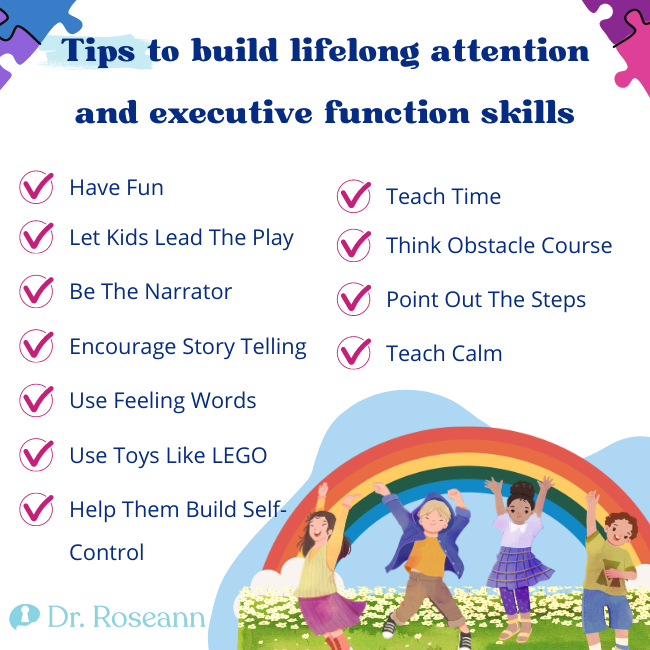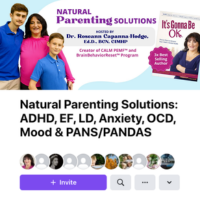What is Executive Functioning of the Brain?
Executive functions are a set of mental skills controlled by the brain’s frontal lobes that help one organize their thinking and actions for a future action or goal. It is all that we do to get a result. It involves strategic planning and organizational skills that help you see that future goal and work towards it. Executive functioning skills develop over time and good skills can be learned.
Contrary to what most people think, we aren’t born with good executive functioning skills. Improving executive function can be done through modeling and direct teaching. Every task is an opportunity for these skills to develop and a child can learn EF skills at home, at school, and with peers. For children of all ages, the play gives children an opportunity to practice and refine these skills in a supportive and hopefully fun way.
Play is a powerful way to enhance learning and brain development and more specifically enhance executive function (EF) skills (Gibbs et. al, 2021). Play is how children explore their world and learn in both an explicit and implicit manner. Research shows that young children with well-developed executive functioning skills are an important predictor for later academic and life success (Gibbs et. al, 2021).

What are the 12 Executive Functioning Skills?
Executive functioning skills encompass a range of cognitive processes that enable individuals to manage and regulate their thoughts, actions, and emotions to achieve goals. While the exact categorization may vary, here are 12 commonly recognized executive functioning skills:
- Working Memory: The ability to hold and manipulate information temporarily, allowing individuals to work with and recall relevant information while performing tasks.
- Inhibition: Executive functioning inhibition is the capacity to control impulses, resist distractions, and regulate behavior, helping individuals stay focused on tasks and make well-considered decisions.
- Cognitive Flexibility: The ability to adapt to changing situations, switch between tasks, and consider multiple perspectives or solutions.
- Planning and Organization: The skill to create and execute plans, organize tasks, and set priorities systematically.
- Initiation: Initiation is the capability to independently start tasks and activities without excessive procrastination or hesitation.
- Task Persistence: The ability to maintain effort and focus on tasks until completion, even when faced with challenges or distractions.
- Time Management: The skill to estimate, allocate, and use time effectively, ensuring that tasks are completed within given time frames.
- Emotional Regulation: The ability to manage and regulate emotions, including recognizing, understanding, and responding appropriately to different emotional states.
- Metacognition: The awareness and understanding of one's cognitive processes, allowing individuals to monitor and evaluate their thinking and problem-solving abilities.
- Response Inhibition: The ability to stop or delay an ongoing response, preventing impulsive or inappropriate reactions in various situations.
- Organization of Materials: The capacity to keep physical and digital spaces organized, including managing belongings and keeping workspaces tidy.
- Goal Setting: The skill of establishing specific, measurable, achievable, relevant, and time-bound (SMART) goals, which provides a clear direction for actions and efforts.
These executive functioning skills work in an integrated manner, supporting higher-level cognitive activities like planning, decision-making, and problem-solving. Challenges in these skills can manifest as executive dysfunction and may be associated with various conditions such as ADHD, autism spectrum disorders, or traumatic brain injury.
Play and Improving Executive Functioning
Play has many benefits including just being a wonderful way to build connections with loved ones and just being fun! Through play, children can learn listening skills, turn-taking, building attachment, developing creativity, cognitive, memory, attentional, behavioral, sensory, and motor skills, and social-emotional skills such as handling disappointment, interacting with others, recognizing feelings in themselves and others, self-control, affection, and positive self-image and self-esteem. Aside from being a good executive functioning therapy, it also helps improve:
- Working memory
- Attention and concentration
- Metacognition
- Language
- Cognitive flexibility
- Self-regulation
- Impulse control
- Self-confidence
- Social-emotional development
How to Improve Executive Function and Attention Through Play

Play is the work of children and when we structure their play in a way that builds executive functioning and attention, children are better able to self-regulate their attention, behavior, and emotions.
Here are my best tips on how to improve executive functioning skills and build lifelong attention:
#1 Have Fun
How to combat executive dysfunction by having fun? Laughter does so much for one’s brain. Play should always be fun and it is a good way for children to learn. So, parents should be focusing on infusing learning and put down their phones. Be in the present moment and play pretend with your young or a board game with your teen. Doing this also builds connections and improves relationships.
#2 Let Kids Lead The Play
When it comes to how to increase executive function, there are many ways to help children. Letting them have fun and take control is a good example. So, never overmanage their play because it will disrupt the flow.
Play lets children problem-solve, role-play, and test out being in control, which are all skills that help them in all areas of social-emotional development. Find appropriate games, like ones that can improve executive functioning activities for middle school students. Promoting executive function in the classroom is easier when children are engaged and having fun.
#3 Be The Narrator
Repeat what they are saying but don’t criticize or question. That’s one good way how to strengthen executive function. Ignore behaviors such as whining or over-silliness. Kids love when adults repeat what they are saying because they feel attended to and this helps them build strong listening skills.
Model, stop, look, and listen. For example, “Let me think about how to solve this problem or fix this.” This oral narration cues children to build their metacognitive planning skills that improve EF and attention.
#4 Encourage Story Telling
Practice storytelling with your child. Whether letting them pretend-play or using something like StoryCubes, storytelling can serve as working memory, language, and executive functioning interventions.
Working memory and executive function help tie the parts of the story together and create parts that build a story that makes sense. With storytelling, how to deal with executive dysfunction has just become easier.
#5 Use Feeling Words
Concentrate on feeling words that come up by repeating your child’s statements. Providing your child with executive dysfunction help alerts them to emotions and allows them to better label and understand their own and other’s emotions. This pays itself forward and you will be glad you invested the time to build emotional skills as your child becomes an adolescent and beyond.
#6 Use Toys Like LEGO
Toys like LEGO allow children to be creative and that helps with the flow of thoughts and ideas, as well as emotions. Whether you have free or structured play with LEGO, it helps children to understand emotions, develop social skills, and explore physical characteristics. Building games such as Jenga, other cooperative games, and memory games are also great problem-solving activities for children and teens.
#7 Help Them Build Self-Control
While your child is having fun, play is also an opportunity for kids to build self-control. Parents can reinforce the play behaviors that demonstrate self-control (“Bunny is using the blocks so nicely with his brother”) and they can simply model desired behaviors while playing (Show your child how the two puppies are waiting their turn).
# 8 Teach Time
Talk about time and how long something should take. Some children and teens are time blind and a sense of time begins to develop when children are young. Asking questions such as, “How long do you think it will take to make these cookies?” will help to give children a sense of time that improves low executive functioning because they can better estimate and plan. Even letting your child know how long a task will take you, gives children a sense of how much time they will need to complete a task.
# 9 Think Obstacle Course
Complex play with steps and rules builds problem-solving and thinking skills. I love setting up obstacle courses with children because they have to be present and plan for future action. Whether inside or outside, physical executive function exercises exercises should be part of every kid’s play experience. Asking questions such as “What is next?” “What do you think” “What made you pick that?” gets children thinking about their actions and sets the foundation for metacognition. Board games are also great for kids of all ages, especially when building executive functioning skills.
#10 Point Out The Steps
Making the implicit very explicit helps to make those metacognitive skills we assume our child has real. Using pictures that outline steps or using other visuals to cue that there are multiple steps helps to develop working memory and multitasking. Asking, “What is the next step?” is also a powerful way for them to manage multi-step directions and tasks. Talk to your child about the steps you are going to take to make dinner or get to an appointment because it allows them to hear your metacognitive planning. When done as part of your daily routine, it tones down the defensiveness of kids with ADHD, EF, Rejection Sensitive Dysphoria, mood issues, or other clinical issues.
#11 Teach Calm
Every child needs play activities that calm the brain and body. In today’s busy world filled with excessive device time, kids need to learn mindfulness skills that help the nervous system self-regulate. They need opportunities to require them to stay focused even when doing “quiet” activities because this is the foundation of self-regulation.
Tips for Executive Dysfunction Treatment
When we teach a child to connect to sensations and thoughts, they naturally become more alert to the environment around them. It is important to remember that alertness is the first part of the attention and concentration they need for academic skills. By paying attention to their thoughts, sensations, and bodies, it improves attention in all areas of learning.
Things such as art activities and reading support the brains of children of every age. We all need quiet activities that give the brain a chance to power down so it can power up. These two tips alone are great ways how to improve executive function skills.
All children can benefit from play and playfulness with their family. When children have opportunities that develop self-regulation skills, they have lifelong benefits in their executive thinking, working memory, executive functioning, and most importantly in social-emotional development. There are lots of ways to provide an executive functioning training program for children and they can be fun and simple activities.
Neurofeedback remains to be the best natural treatment for executive dysfunction.
Neurofeedback is a form of biofeedback that aims to train individuals to regulate their brain activity, with potential applications for treating executive dysfunction.
During neurofeedback sessions, individuals receive real-time information about their brainwave patterns and learn to self-regulate these patterns. While some studies suggest potential benefits for improving attention and executive function, more research is needed to establish the long-term effectiveness and generalizability of neurofeedback as an executive functioning treatment.
What are executive functions in the brain?
Executive functions refer to a set of cognitive processes primarily associated with the function of the prefrontal cortex. This executive functioning part of the brain enables individuals to control thoughts, actions, and emotions to achieve goals. These functions include working memory, inhibition, cognitive flexibility, planning, initiation, time management, emotional regulation, and metacognition. They play a crucial role in tasks such as problem-solving, decision-making, and adapting to changing situations.
What is the function of the prefrontal lobe?
The purpose of prefrontal cortex is integral to executive functions, which encompass a range of cognitive processes such as working memory, cognitive inhibition, cognitive flexibility, planning, and problem-solving. These functions are crucial for goal-directed behavior and the regulation of thought and action.
What is response inhibition?
Response inhibition or inhibition control is a cognitive function associated with the ability to control or suppress one's automatic or prepotent responses to stimuli. It involves the capacity to stop or delay an ongoing behavior, refrain from impulsive actions, and resist distractions or interference from irrelevant information.
How to improve executive function for adults?
To improve executive function in adults, break tasks into smaller steps, use visual aids like calendars and planners, and establish clear goals and routines. Additionally, prioritize tasks based on importance, practice mindfulness, do regular exercises, engage in executive function activities for adults, and ensure a healthy lifestyle with adequate sleep. Consider seeking professional support to get executive function coaching for adults.
How to improve executive function ADHD?
Some strategies to improve executive function in individuals with ADHD include implementing structured routines, external organizational executive functioning tools, and time management techniques. Encourage regular exercise, consider occupational therapy for executive functioning, and provide positive reinforcement to support the development of effective coping mechanisms. Involve parents, teachers, and support networks in creating a consistent and supportive environment tailored to the child’s needs.
How to teach executive functioning skills?
Improve poor executive functioning skills by providing explicit instruction, modeling desired behaviors, and utilizing visual aids like charts or an executive functioning skills checklist. Go through executive function training using neurofeedback and encourage goal-setting to develop organizational and planning skills. Offer supportive feedback, teach time management, and foster problem-solving abilities, collaborating with parents and teachers to create a supportive environment for skill reinforcement across different settings.
Should I use drugs that improve executive function on my child?
Natural treatments for addressing executive function challenges in your child are preferred as ADHD drugs can modify their developing brains. Focus on promoting a balanced diet, regular physical exercise, and sufficient sleep. Introduce mindfulness practices, establish consistent routines, and consider behavioral therapy or educational support to enhance executive function abilities. Neurofeedback, PEMF therapy, and magnesium supplements can greatly provide executive functioning help.
How to build executive functioning skills in adults and kids?
Executive functioning lessons indicate the use of visual aids such as calendars. Set clear, achievable goals, prioritize tasks based on importance, and develop effective time management techniques. Incorporate mindfulness practices, engage in cognitive training activities, and consider seeking external support to enhance executive function, while reinforcing positive behaviors through a system of rewards and celebrations.
How to stop executive dysfunction issues?
To address executive dysfunction the first step is to enhance cognitive function. Seeking professional support for personalized executive function disorder strategies, maintaining adequate sleep, and implementing positive reinforcement can contribute to a comprehensive approach to managing and improving executive functioning skills for students.
Citations:
Gibb, R., Coelho, L., Van Rootselaar, N. A., Halliwell, C., MacKinnon, M., Plomp, I., & Gonzalez, C. L. R. (2021). Promoting Executive Function Skills in Preschoolers Using a Play-Based Program. Frontiers in psychology, 12, 720225. https://doi.org/10.3389/fpsyg.2021.720225
Always remember… “Calm Brain, Happy Family™”
Are you looking for SOLUTIONS for your struggling child or teen?
Dr. Roseann and her team are all about solutions, so you are in the right place!
There are 3 ways to work with Dr. Roseann:
You can get her books for parents and professionals, including: It’s Gonna Be OK™: Proven Ways to Improve Your Child’s Mental Health, Teletherapy Toolkit™ and Brain Under Attack: A Resource For Parents and Caregivers of Children With PANS, PANDAS, and Autoimmune Encephalopathy.
If you are a business or organization that needs proactive guidance to support employee mental health or an organization looking for a brand representative, check out Dr. Roseann’s media page and professional speaking page to see how we can work together.
Dr. Roseann is a Children’s Mental Health Expert and Licensed Therapist who has been featured in/on hundreds of media outlets including The Mel Robbins Show, CBS, NBC, PIX11 NYC, Today, FORBES, CNN, The New York Times, The Washington Post, Business Insider, Women’s Day, Healthline, CNET, Parade Magazine and PARENTS. FORBES called her, “A thought leader in children’s mental health.”

She coined the terms, “Re-entry panic syndrome” and “eco-anxiety” and is a frequent contributor to media on mental health.
Dr. Roseann Capanna-Hodge has three decades of experience in working with children, teens and their families with attention-deficit hyperactivity disorder (ADHD), autism, concussion, dyslexia and learning disability, anxiety, Obsessive Compulsive Disorder (OCD), depression and mood disorder, Lyme Disease, and PANS/PANDAS using science-backed natural mental health solutions such as supplements, magnesium, nutrition, QEEG Brain maps, neurofeedback, PEMF, psychotherapy and other non-medication approaches.
She is the author of three bestselling books, It’s Gonna Be OK!: Proven Ways to Improve Your Child's Mental Health, The Teletherapy Toolkit, and Brain Under Attack. Dr. Roseann is known for offering a message of hope through science-endorsed methods that promote a calm brain.
Her trademarked BrainBehaviorResetⓇ Program and It’s Gonna be OK!Ⓡ Podcast has been a cornerstone for thousands of parents facing mental health, behavioral or neurodevelopmental challenges.
She is the founder and director of The Global Institute of Children’s Mental Health, Neurotastic™Brain Formulas and Dr. Roseann Capanna-Hodge, LLC. Dr. Roseann is a Board Certified Neurofeedback (BCN) Practitioner, a Board Member of the Northeast Region Biofeedback Society (NRBS), Certified Integrative Mental Health Professional (CIMHP) and an Amen Clinic Certified Brain Health Coach. She is also a member of The International Lyme Disease and Associated Disease Society (ILADS), The American Psychological Association (APA), Anxiety and Depression Association of America (ADAA) National Association of School Psychologists (NASP), International OCD Foundation (IOCDF).
© Roseann-Capanna-Hodge, LLC 2023
Disclaimer: This article is not intended to give health advice and it is recommended to consult with a physician before beginning any new wellness regime. *The effectiveness of diagnosis and treatment vary by patient and condition. Dr. Roseann Capanna-Hodge, LLC does not guarantee certain results.













